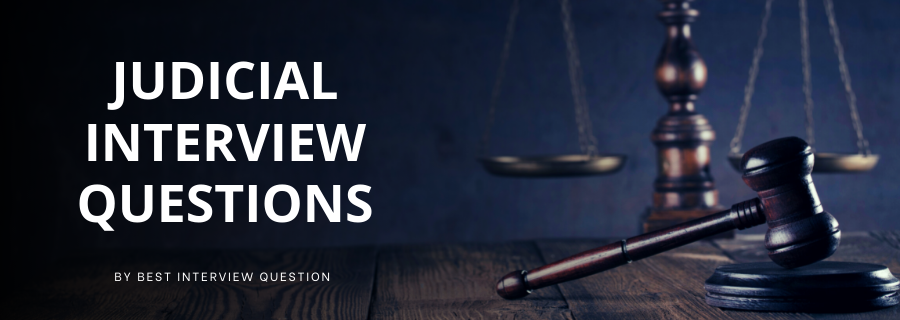Judicial Interview Questions and Answers

Most Frequently Asked Judicial Interview Questions
Here in this article, we will be listing frequently asked Judicial Interview Questions and Answers with the belief that they will be helpful for you to gain higher marks. Also, to let you know that this article has been written under the guidance of industry professionals and covered all the current competencies.
Out of three branches of the federal offices, the judicial branch involves civil as well as criminal courts. The primary role is the interpretation of the Constitution and then limiting the power of the other departments.
The Police department records a criminal case any information received about the commission of a cognizable offense in a written form. FIR is a report of information which the police department gets the first in the point.
It falls under Section 151 of the Code of Criminal Procedure. A police officer many arrests the suspect in case of any cognizable offense without any warrant or orders from Magistrate. It is one of the frequently asked Judicial Interview Questions and Answers.
These are the powers which empower the court in doing complete justice between the parties. The inherent powers cannot be taken away from the courts. Some of the intrinsic power of the court is peculiar in criminal jurisprudence. It is the power which removes the province of criminal law jurisdiction from the malicious influences and moral corruption. The context of the issue is the limitation of power, scope, and the extent.
Under Section 482, an FIR can be quashed, no matter if there is a charge sheet or not. There is a prevention of the abuse of the miscarriage of justice or the process of the court.
In the summary trial in a Magistrate court, the main focus is on trying and disposing the case at once. The complicated and complex cases which require more time and inquiry process are beyond the area of such summary trials
It is also known as preliminary hearing in criminal law which get to know if the person has been charged with any serious crime that is punishable in the state prison and then if he is charged for the crime and if there were any shreds of evidence for the same.
CPC Act is Civil Procedure Code Act is there to amend and integrate the laws as per the procedure of the Courts of Civil Judicature. Memorizing these sections and acts can help get good marks in Judicial Interview Question and Answer.
DPSP or the directive principles of state policy are the rules and the guidelines which are required for framing of the laws used by the government. Part III constitutes these rights of the Constitution. These rights are applied irrespective of the place of birth, race, creed, gender, religion, etc. The courts enforce these rights, and they are subject to the specific limitations.
| S.no | Robbery | Dacoity |
|---|---|---|
| 1. | It can be committed by an individual | There are a more significant number of persons involved here, at least five |
| 2. | The real culprit will be punishable for the committed offense | No matter if all the persons are a part of the crime, all will be punished |
| 3. | It falls under Section 392, 394 | Section 391, 395 include any offense under dacoity |
Duties of an agent include-
- Acting within the power and the scope of the authority delegated by the principal.
- Duty is acting on behalf of the judiciary
- An agent is subject to the principal’s control
- Performing every action and duty with elegance and utmost care
- No conflicts between any of the personal interests or those of the principal
- Handing over the monies to the principal which were connected on its behalf
When the primary obligations of a contract come to an end, then it occurs. With the end of this contract, there also comes the end of the contractual relationship. These are the prime obligations which are to be fulfilled; otherwise the parties may need to terminate the contract.
SPES Succession is the one who will succeed to a property of the ancestors, or it is the apparent heir succession of an estate. It involves the succession of the property of a dead family member.
This Judicial Interview Question and Answer can assist you in making a good impression over the interviewer.
FIR is the report lodged in the written form by the Police after receiving any information about the offense.
The complaint is filed by Police when the victim himself lodges it or if anyone from his behalf lodges it.
Under this section of CrPC, the court can quash any criminal proceedings which might not have the proper details of the inherent powers of the court.
Qisas
It is one of the punishment forms in traditional Islamic criminal jurisprudence. It is available to the victim or the heir of the victim against the one who has committed any injury or any murder.
Diyat
Under the Islamic Law, it is money-related composition which the victim or its heir gets when subjected to any property damage, any bodily harm or murder. It is the opposite of the punishment covered under Qisas.
